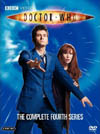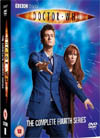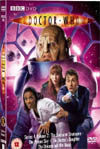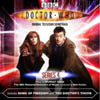The Unicorn and the Wasp
 |
 |
 |
DVD NTSC
Region 1
14-episode
box set




|
DVD PAL
Region 2
14-episode
box set


|
DVD PAL
Region 2
4-episode volume


|
|
(Doctor Who Story No. 199, starring David Tennant)
- written by Gareth Roberts
- directed by Graeme Harper
- produced by Susie Liggat
- music by Murray Gold
- 1 episode @ 45 minutes
|
Story: It couldn't be a coincidence that the
Doctor and Donna find author Agatha Christie at a
social party in the 1920's surrounded by the same
kind of murder mystery that she so often writes,
could it? Checking the date, the Doctor closes in
on the truth behind a haunting hole in her known biography,
and suspects unearthly powers are in play....
|
|
DVD Extras (box sets only) include:
- Audio commentary by
actresses Fenella Woolgar (Agatha Christie) and
Felicity Kendal (Lady Eddison).
- Doctor Who Confidential featurette: Nemesis (12 min.) with
Woolgar,
David Tennant (The Doctor),
Sandy McDonald (Footman),
director Graeme Harper,
writer Gareth Roberts,
executive producer Russell T. Davies, and
vintage car owner Malcolm McKay.
- Deleted Scenes (7 min.) - introduced by Davies
- Trailers & Promos
In-Depth Analysis Review
by Martin Izsak
|
|
WARNING: This review contains "SPOILERS", and is intended for
those who have
already seen the program. To avoid the spoilers,
read the Buyers' Guide version instead.
|
We now come to the second of the two "tent poles" that Russell T. Davies
tried to arrange to counteract the "mid-season slump" in viewer figures.
While it's easy to see how
"The Doctor's Daughter" (story no. 198)
fits that bill, this long-time devoted fan is left scratching his head,
wondering what the corresponding big attraction is here. For me,
the mid-season slump was right on cue.
Perhaps simply having the anticipation of the Doctor meeting
Agatha Christie was enough of a selling point to continue to put viewers
back in front of their TV sets for another week. Those of us tuning in
for galactic travel, alien planets, and philosophically varied cultures
are in for disappointment, getting the typical run-of-the-mill dose of
historical Britishness that can be seen on nearly everything else the
BBC makes. Yeah, they threw in an alien too, a pretty standard move
for a Doctor Who story. Don't be surprised if I think it's less than
a radical new twist. It's really just an overgrown wasp, labeled alien.
Barely the Doctor Who standard.
Mind you, it isn't a bad idea to be doing a Doctor Who story structured
like an Agatha Christie mystery, with the added twist of having the
much-loved author in it herself. The biggest problem there might be
cramming the large whodunit cast into such a short story, while also
cramming in Doctor Who's usual running around & monster chases at the
same time. The whodunit mystery has no real space to breathe. The
questions barely register with the audience before a big scene
pours out all the answers and revelations on top of us. No room
for escalations, red herrings, clues and paths that twist towards the truth,
then away, then back again. As with
"The End of the World" (story no. 162)
for "whodunit" reasons, and half-a-dozen other stories this decade
for other reasons, the story is simply too short to be powerful or
have its true intended impact. Leaving us with questions for a week
while waiting for subsequent answers, while we try to figure out the
answers ourselves, is a sorely missing opportunity.
I still remember studying Part One of
"Frontios" (story no. 133)
before the following episodes were broadcast,
and predicting that the lighting device that Turlough shakes would become
important to resolving the plot. We should have time & opportunity to
wonder likewise about the box of intricate tools found in the bushes in
this story, yet we rocket through the whole thing so disappointingly
quickly.
Ultimately, for those looking for a good Agatha-Christie-style mystery
brought into the Doctor Who sci-fi arena,
"The Robots of Death" (story no. 90)
will probably satisfy more. Or any of the Steven Moffat stories
from this decade of Doctor Who.
|
This story won't be getting any extra points for using the TARDIS
to good effect either, with the disappointing off-screen materialization
really drawing attention to the fact that the show ignores the effect
more often than getting it right. Granted the footage was shot with
an entirely different (but not any better) opening in mind. Had the
flashback bracket remained, the TARDIS would have got some extra movement,
and still without any proper external shots. Arrggh!
When will they learn....?
One of this story's highlights for me was the inclusion of actor
Christopher Benjamin in the cast - a very good call considering the story's
requirements. Benjamin has a number of excellent moments in a few scenes,
but again, the story is too short to give him enough to do to satisfy his
fans like me, or really to differentiate his character significantly enough
from his previous portrayal of Henry Gordon Jago in
"The Talons of Weng-Chiang" (story no. 91).
While he is enjoyable here, one ultimately has to turn to "Talons" or
"Inferno" (story no. 54)
to see the best of him in Doctor Who.
|
Music by Murray Gold
"The Unicorn and the Wasp" (3:11 suite)
is available on:
|
|
Writer Gareth Roberts seems to be repeating patterns for historical stories
that he previously revealed back in last year's
"The Shakespeare Code" (story no. 184),
beginning with having the Doctor meet a famous author that Roberts admires,
our time traveler gushing a bit too much over them and acting a bit too much
like a giddy fan. As before, questions of history being altered are brought
up and not really handled very elegantly, while the genesis of some of the
author's most famous ideas threatens to become lost in ridiculous loops
of time (something echoed once more in Steven Moffat's Season 30
prequel scene "Time Crash").
Of all these repeating patterns, the truly worthy one is that of the
adventure at hand attempting to fill in the remaining blanks in the known
history of the famous author, which works fairly well in this tale.
And I think the loss of the flashback bracket surrounding the story
(included as deleted scenes on the DVD) aids the idea of the answers
remaining a mystery for later fans of her books.
Though a lot of standard, formulaic patterns are on display here,
the finished product is a decent episode of television, with much in it
to enjoy. Both the writing and the production seem more polished than
last year's "The Shakespeare Code", and on the whole I think I like
this adventure better. The Wasp is still less original and
less interesting than the underdeveloped Carrionites, although it
doesn't beg for greater development the way the Carrionites did.
Still, historical British murder mysteries are not what I tune in for,
particularly if they're too rushed as this one was. In the end,
I think this story will barely stay ahead of
"Partners in Crime" (story no. 194)
to take second-last place in the season rankings. Much better things
are in store this season, beginning with the very next episode....
International Titles:
Deutsch: "Das Einhorn und die Wespe"
Magyar: "Az egyszarvú és a darázs"
Français: "Agatha Christie mène l'enquête"
Русский: "Единорог и оса"
Italiano: "Un caso per Agatha Christie"
This story has become available on DVD.
Click on the Amazon symbol for the location nearest you
for pricing and availability:
 |
 |
 |
DVD NTSC Region 1
14-episode boxed set
for the North American market:
 in the U.S.
in the U.S.

 in Canada
in Canada

|
DVD PAL Region 2
14-episode boxed set
for the U.K.


|
DVD PAL Region 2
4-episode volume
U.K. format only


|
Note: The full season sets
contain commentaries, behind-the-scenes
featurettes, and other extras.
The smaller volumes only feature the plain episodes.
Comments on this article are welcome. You may contact
the author from this page:
Contact page
|









